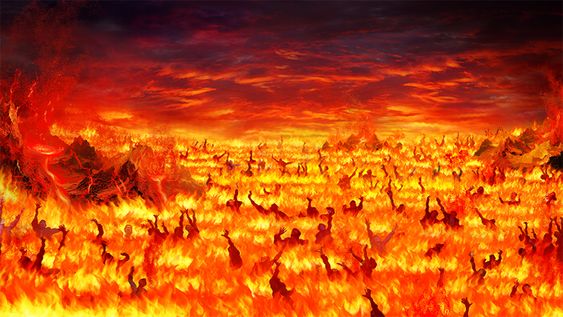The blazing tongues of eternal flames rolling over and over like an angry sea are never satisfied. At this very instant while you sit turning these pages, blood-chilling screams are piercing the horrible blackness of hell. Hell is on the move! Its merciless waves of fire are reaching onward, ever upward, like the mad onrush of flood waters surging, churning, devouring those lost souls which are dropping off into its bottomless pit by the minute. The scoffer will make a joke of the word hell, but in the gravest of tones Christ warned men to fear Him who could kill both soul and body and cast him into hell. And as another warning, Isaiah waves the red lantern of danger when he shouts aloud: “…Hell hath enlarged herself, and opened her mouth without measure…” (Isa. 5:14).
Hell is moving, its flames leaping ahead, shoving against each other in their greedy effort to torture the never-dying souls of the damned. To torture but not to kill, for the soul cannot die. Hell is not some grave in which the body reposes after death, as the Modernist would have you believe. Isaiah picked up his pen to issue further information, “Hell from beneath is moved for thee to meet thee at thy coming…” (Isa. 14:9).
According to a recent article by a well-known writer, sixteen miles beneath the surface of the earth lies a raging, smoking mass of flames. No one can truthfully declare this to be hell; however, we wonder sometimes what lies near the heart of the earth to cause all the earthquakes, the volcanoes, the boiling geysers. While we cannot locate hell on the map, we know that it does exist. Because it is not something he can see with his eyes, the Modernist laughs at its existence. How foolish! Neither can he see death! Neither can you or I see the devourer called Death, but who would doubt its power? Hell is moving, and even as the infidel prepares his lecture on the impossibility of an existing hell, the flames are leaping and spreading like the flames of a prairie fire.
We do not want to stake our souls on the opinions of men; let us rather call for the writers of the immortal gospel to tell us the truth about this abode of the damned. What is it like? Matthew 8:12 describes hell as a place of weeping and wailing; a place of outer darkness. Isaiah goes on to tell about it enlarging itself; John says that the damned gnaw their tongues in pain and the smoke of their torment ascends up forever and ever: and they have no rest day or night…this rubs out the theory that hell is the grave. It also blots out the idea that hell is a temporary arrangement where men and women learn a lesson and pass through a purifying process before they are admitted into the presence of God and the holy angels. The Bible does not once mention the world purgatory, nor does it suggest that such a place exists. Purgatory is man’s idea; hell is God’s truth.
The Bible tells us in no uncertain words about a man who lost his soul. The Modernist has hastened to declare this, the story of the rich man and Lazarus, a parable. But even if it were a parable—we are not arguing—what is a parable but a likeness, a similitude between the earthly and the heavenly? The rich man did not go to hell as a senseless soul, but rather as a man clothed in his right mind and endowed with his normal senses. He could hear; he could think; he could feel; he could see; and his soul was deathless. The rich man who had spent his life in luxurious living lifted up his eyes in hell, and in his misery recognized Lazarus in Abraham’s bosom. He could see! He could see the glorious world above, which he had missed. I am persuaded to believe that the doomed man in hell can see the wonderful place called heaven if only for a minute of time. I believe he will be privileged to see his loved ones marching inside those gates of pearl…if it can be called “privileged,” because the sight of the beautiful place called heaven, which he might have claimed for his own future home, will only serve to make his suffering more intolerable.
The doomed sinner will also be able to hear. He can hear the blasphemy, the groaning’s and moaning’s of men who have lost their souls. He can hear them as they scream in the darkness and offer prayers to a God who has turned His back on them forever. The gnashing of teeth; the cursings as they rail and beg for water. The rich man heard the answer of Abraham which blasted his last silver hope when Abraham reminded him that there was a great gulf fixed between him and Lazarus, and that gulf could not be spanned.
The rich man could feel. He pleaded with Abraham and cried out that he was tormented in the flames and begged for mercy…for a drop of cold water; but this was denied him. Abraham, seeing his hopeless state, merely reminded him to remember. And as long as time lasts—while worlds revolve and spheres roll—a damned man in hell will remember. He can remember the lost opportunities which he had, every sermon he ever heard, every prayer he heard, every tear shed for him—he will have to remember. If the rich man had been cast into hell with his sight gone, his hearing and feeling gone, his mind a blank, the picture in the Bible would not be so utterly horrible; but he realized that he was doomed, and was tormented by the memory of the time when the poor man laid at his gate and he refused to heed him. He was tormented by the memory that he had deliberately made his choice by ignoring Moses and the prophets.
Even a minor burn on our hand causes us great anguish and pain, but this is nothing to compare with the unutterable agony of a body writhing in flames seeking death, but death fleeing from the damned. No sane person who has ever read of the suffering of the damned in hell would want to go there, where there is no such thing as help, for hell is the place where the doomed realize that there is no hope for them.
We have thought of the things which will be in hell; but let us think for a minute of other things which won’t be found there. Here, we enjoy the beautiful strains of music; but in hell the only sounds which will greet the ears will be the anguished cry of the damned, their cursing and blaspheming. Hell will have no music. Hell will contain no flowers. Even the poorest of men here can enjoy the beauty of the wild flowers springing up along the road, but no roses exist in the brimstone and fire of hell. Hell will have no beauty; no little babies will go there. You might have looked into the face of some silent little form and vowed that you would meet it again. Then you’ll have to prepare to meet that little one in heaven, for there will be no innocent little babies in hell.
There will be no prayers of God’s people in hell, no altar calls, no tears shed over your soul. And as long as God is, that is how long the fires will rage and the damned be tortured. Sin is insanity, AND HELL IS GOD’S INSANE ASYLUM: HELL IS GOD’S PENITENTIARY WITH NO EXIT, no way of serving out a sentence, no way of escape.
In…prisons, we have seen many inmates serving out their sentences. Many of them keep calendars hanging over their cots to check off the days served. They are looking across the years to that glorious day when they will have at last paid their debt to society and can be released. But there is no release from hell! If one single drop of water was dripped constantly upon a small rock, the rock would in several hundred year’s wear away. But if that same little drop of water dripped long enough to wear away our tallest mountains, our granite hills, our iron and steel bridges, eternity would have just begun. Eternity would have no less days—there would be no less time for the damned souls in the regions of despair.
Since we have looked into God’s Word for facts about the horrible place, let us look again to find the answer to the question in our minds: Who is going there? Jesus Himself once asked the question, “how can ye escape the damnation of hell?” David, the psalmist, comes forth with a statement that uproots the doctrine of predestination when he says, “If I ascend up into heaven, thou art there: if I make my bed in hell, behold, thou art there” (Psa. 139:8). Notice he says, “IF I make my bed in hell…”
This makes it clear that the individual makes his own choice. You have heard people say that if God chooses to send one to heaven or to hell, He does it, and man has no choice in the matter. David, the man after God’s own heart, is easily understood when he made the fact so plain that heaven or hell may be his; he has the opportunity to make the choice. You and I can make the same decision. The poorest and the richest have to come alike—they must repent of their sins if they would escape hell.
John comes back with more information about who will go there: “And whosoever was not found written in the book of life was cast into the lake of fire” (Rev. 20:15). David took up his pen again to say, “The wicked shall be turned into hell, and all the nations that forget God” (Psa. 9:17). The Apostle Luke says, “…except ye repent, ye shall all likewise perish.”
Then, we conclude that to escape the awful place called hell, one must repent of his sins. The rich man, the powerful man, the educated man must repent as does the ragged beggar who has to make an “X” for his name. If you have not made peace with God, then you must repent to escape hell. Jesus died an agonizing death and spilled His blood, staining the old rugged cross crimson for you and for me. Will you accept His invitation to spend eternity in the glorious region in the heavens by repenting of your sins? Or, will you ignore His pleading and be cast in to the lake of fire…will you go over the prayers of God’s people…will you go as an intruder to the place called hell which was prepared for the devil and his angels…will you go over the mangled body of the Son of God?
The choice is left to you! Jesus did all He could possibly do when He opened up a road of escape and declared, “It is finished.” The messengers of God are holding out the danger signals in a grave effort to point you away from the broad road and onto the road to heaven, saying, “Turn ye! Why will ye die?” Sinner, turn. “How shall we escape, if we neglect so great salvation?”


